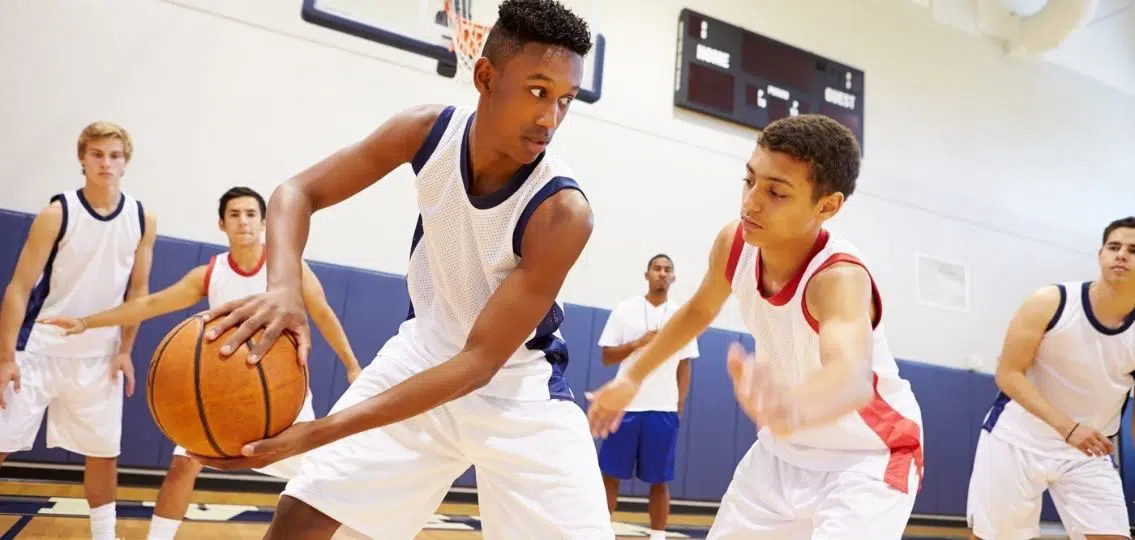After a season-ending broken wrist in February 2020, my 16-year-old son took last basketball season off and focused on surviving online school. This year, though, like the good mom I try to be, I encouraged (pushed?) him to play in a season that has started to feel like an episode from a reality show called Adults Behaving Badly.
I’ve been guilty of some bad behaviors myself. At a recent game when our team was losing by dozens of points in the second half, the other team’s student section continued to obnoxiously taunt our players, prompting me to turn to the laughing parents behind me to say, “Aren’t you embarrassed?” They replied, “Are you embarrassed by the score?”
Touché, I guess.
But I wasn’t embarrassed by the score. We’ve had losing seasons before. I cared that the entire experience felt toxic and joyless to me, and it was my fault my son was on the court in the first place.
Sure, the players are going to get called for fouls of frustration, and the student section might yell some rude cheers. Their brains are still growing. (As I’ve said 863 times, I’m so glad social media didn’t exist when I was in high school because I know I did/said gobs of stupid things.)
But there’s no excusing the grown-up behavior.
During our first official game of the season, in the quiet moments before my son shot some clutch free throws, a toxic sports parent from the opposing side yelled, “He can’t shoot!” loud enough to reverberate through the gym.
Luckily my son made those shots, so my husband and I turned to the man and exclaimed in unison, “Yes, he can!” That moment ended with some levity, but others haven’t.
We have nine players on our city public school varsity team, including one 8th grader. We didn’t have enough players for a JV team. I’m not sure why our numbers are so low, but with that shallow bench, our players are often exhausted by the end—and the scores reflect that.
In one of our recent games, we were losing by more than 20 points shortly after half. At timeouts, every player’s head hung low, eyes studying patterns in the hardwood floors.
And still the opposing teams’ coaches left starters in and continued a full-court press. In the stands, adults kept cheering every single time their press forced a turnover.
“Was any of it fun?” I asked my son, attempting to break the silence as we walked out to the car after that stinging loss.
“Do you think losing every game is fun?” he asked. Again, touché.
I’ve since quit asking that question and trying to paint bright colors on a morose scene. My go-to mode has usually been Pollyanna: “Oh, at least you’re making memories with your teammates. You’re going to be in such great shape from all that running up and down the court. Your team is young and you’ll be better next year.”
My glass-half-full perspective isn’t always helpful, however. So now I let him sit quietly in the back on the ride home.
In 2019, I might’ve said, “Just think of the resiliency you’re building. Playing a sport is about so much more than winning a game.”
But I think our teens have had enough experience with resiliency for a while.
I’m not saying the other coaches need to let our team win or even score more points. I’m not saying the parents shouldn’t be cheering for their own team. But some common sense and a reminder we are watching teenagers might be helpful. Teenagers who, like the rest of us, are nearing the two-year mark of collective losses and disappointments.
After yet another recent loss, I headed up to bed after my son had showered and was eating a late dinner. I stopped by the table, kissed the top of his head, and said, “I’m sorry your season sucks so bad. I wish I could fix it, but I know I can’t.”
He nodded silently.
I’m learning, slowly, that even though I wish I had a magic wand to make it better, sometimes my teens just need me to acknowledge that all is not well.
At the end of our last game before the winter break, the team stepped back onto the court after a much-needed timeout, weary but ready. Even though they knew they would lose, they still scrambled for loose balls, drove in for layups, and hustled back on defense. My son was fouled and stood at the line, the jeering student section right behind the basket trying to rattle him as he drained both shots. Even though those two points didn’t alleviate the sting of defeat, his poise—and his team’s determination—reminded me that maybe they don’t need magic after all.
